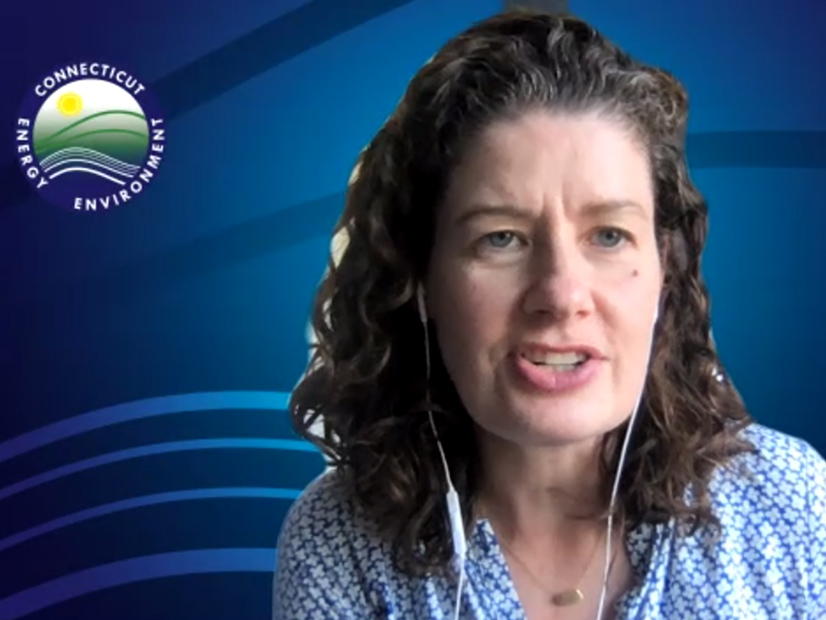New England states’ aggressive decarbonization goals need equally bold technology innovation and public policy to drive an equitable transition, speakers told the annual New England Energy Conference and Exposition (NEECE) last week.
Panelists discussed this confluence during the closing session of the conference, hosted by the Connecticut Power and Energy Society and the Northeast Energy and Commerce Association, “Theme of the Moment: How State Policy and New Technology Goes Green.”

Katie Dykes, commissioner of Connecticut’s Department of Energy and Environmental Protection (DEEP), said her state is “laser focused” on statutory economy-wide emissions reduction goals of 45% by 2030 and 80% by 2050, in addition to pending legislation mandating a carbon-free electric supply by 2040.
“We expect we’re already going to be 91% carbon-free in our electric supply, based on our [offshore wind] contracts, by 2025,” Dykes said.
According to Dykes, Connecticut is also on the cusp of “a real game-changer set of policies.” A bill that would direct DEEP to create rules for implementing the Transportation and Climate Initiative Program (TCI-P) is under consideration in the General Assembly. TCI-P is a multistate cap-and-trade program to reduce greenhouse gas emissions from vehicles by 26% from 2022 to 2032.
The bill also outlines plans for investing Connecticut’s proceeds from the auction of emissions allowances. TCI-P projects to raise up to $89 million starting in 2023, increasing to as much as $117 million by 2032. The bill would direct at least 50% of this money to communities overburdened by air pollution or underserved by the transportation system. It also would establish an equity and environmental justice advisory board to counsel DEEP and the Department of Transportation on TCI-P to ensure equitable outcomes.
“We think [TCI-P] will be a significant investment in electric vehicle charging, rebates and other things that we can position in the marketplace to ensure equitable participation in a decarbonized and electrified transportation future,” Dykes said.

Judith Judson, vice president and head of U.S. strategy for National Grid (NYSE:NGG), said the utility aims to reduce economy-wide emissions by 50% below 1990 levels by 2030 and achieve net-zero emissions by 2050. The utility has more than 20 million people in New York, Rhode Island and Massachusetts.
“We’ve already picked the low-hanging fruit, including phasing out coal and investing in energy efficiency measures, so now we need to tackle the remaining emissions by transforming our energy systems at an unprecedented rate of change,” Judson said.
National Grid’s plan to reach net-zero emissions by 2050 includes demand response and energy efficiency and decarbonizing its gas network through renewable natural gas and hydrogen, she said. Judson added that large-scale renewables, distributed resources, battery storage, transportation electrification and heat pumps are integral parts of the future.

John Holtz, senior director of market development and regulatory affairs for NRG Energy (NYSE:NRG), said that in the 1990s not many people were thinking about renewable energy. Holtz said that competitive suppliers sold nearly 30 million MWh of renewable electricity in 2019.
“Renewable energy has been the most enduring impact of retail energy competition policy in the states,” Holtz said. “Consumer demand and competitive markets helped drive investment in renewable energy and help bring us back environmental benefits. The retail industry has taught customers that they can buy energy products, not just from their local utility, but from other companies as well. That’s a powerful combination for achieving our renewable energy and decarbonization goals.”
Paul Hockenos, a Berlin-based journalist who focuses on renewable energy and climate change issues for several publications, said this is an “epic transformation of our society and economy.”
“Everything’s going to be changing, and in this massive restructuring that’s going on, it’s a vast mosaic with thousands of pieces,” Hockenos said. “Everybody in our society, everybody in the economy has a role to play, small or large.”
He said the Fridays for Future movement, started in 2018 by then 15-year-old Greta Thunberg of Sweden, illustrates that the threat of climate change goes beyond policymakers and “utterly changed the discourse in Europe.”

“They’ve made more happen at the upper levels of government than all of the scientists banging on the doors of these offices week after week,” Hockenos said.
Dykes said that in the “political sphere,” states tend to work on carbon policies in consideration with environmental groups, technology companies and utilities, but bringing in other stakeholders can broaden the discussion, explicitly citing TCI-P for context.
“There are many communities and folks who get behind clean transportation, but their primary driver is not necessarily carbon,” Dykes said. “It may be asthma, public health and air quality or wanting a safer transportation system or to boost their downtown development.”
She said not every conversation has to start with greenhouse gas emissions “in your first sentence;” that gets more people “interested in understanding and advancing a climate policy.”



